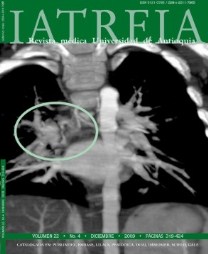Epigenetics in asthma
DOI:
https://doi.org/10.17533/udea.iatreia.11111Abstract
postulated that several genes with variable effects are involved in its pathogenesis along with environmental factors. It has been suggested that epigenetic mechanisms can mediate the effects of environmental factors on the onset and progression of the disease. Epigenetics describes inheritable changes in gene expression inherited during meiosis and mitosis that are not encoded in the DNA sequence. They include DNA methylation/ demethylation, acetylation, deacetylation, ubiquitination, SUMOylation and phosphorylation of histones, changes in microARN and alterations of chromatine. In this article we review some findings that establish a relationship between some epigenetic mechanisms and the inflammatory process in asthma and exposure to environmental factors. They include increasing the activity of histone acetyl-transferases and the expression of histone acetylating enzymes, decrease of deacetylating enzymes in the lungs of asthmatics; increased expression of the transcription factor NF-κB in the allergic inflammatory process, changes in methylation/demethlylation of DNA during the differentiation of lymphocytes and the stimulation/suppression of IL-4 and IFNγ genes, respectively.
Smoking, bacterial and viral infections, maternal diet and environmental pollution are also factors that trigger epigenetic processes such as histone acetylation and induction of inflammatory cytokines, inactivation of histone deacetytransferases, polarization of the immune response toward the Th2 type and increased production of IgE and cytokines of this profile. We review the epigenetic effects resulting from therapy with corticosteroids and theophylline, and other factors that might influence the risk of asthma in childhood such as maternal intake of fruits, vegetables, fish oils, vitamins, minerals, and the use of probiotics and antibiotics during pregnancy.
Downloads
Downloads
Published
How to Cite
Issue
Section
License
Papers published in the journal are available for use under the Creative Commons license, specifically Attribution-NonCommercial-ShareAlike 4.0 International.
The papers must be unpublished and sent exclusively to the Journal Iatreia; the author uploading the contribution is required to submit two fully completed formats: article submission and authorship responsibility.














